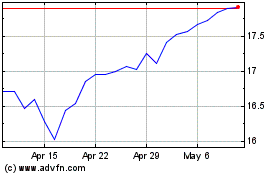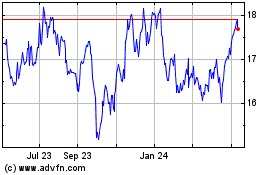PG&E Stock Rises as Regulator Mulls Utility's Future -- 3rd Update
November 16 2018 - 6:30PM
Dow Jones News
By Katherine Blunt and Russell Gold
Shares of PG&E Corp. rallied Friday on hopes that California
officials would move to rescue the utility from potential wildfire
liability costs that threaten to drive it into bankruptcy.
But state legislators gave little indication of whether they
would propose a way to let PG&E pass costs from liability
lawsuits stemming from this year's fires to customers, a likely
necessity to ensure the company's solvency.
The stock's rebound came after California's top energy regulator
late Thursday indicated an openness to letting the utility bill
customers for some of those costs, a signal that boosted PG&E
by nearly 38% on Friday, to close at $24.40.
The share price had fallen for six consecutive days on concerns
that PG&E, already facing billions of dollars in potential
liability costs from 2017 wildfires, could face even higher costs
related to this year's Camp Fire in Northern California, which has
killed more than 60 people, making it the deadliest wildfire in
state history.
Michael Picker, president of the California Public Utilities
Commission, said in an interview Thursday that he preferred that
PG&E not enter into bankruptcy because it could raise its cost
of borrowing, which could end up raising energy costs for its
customers. "It is generally not good policy for utilities to go
into bankruptcy," he said.
The utility, which is based in San Francisco, disclosed late
last week that a problem occurred on one of its high-voltage power
lines in Northern California 15 minutes before the start of the
Camp Fire was reported in the area on Nov. 8. No definitive
connection between the line outage and the fire has been made, and
California fire investigators will likely take months to make a
final determination.
PG&E, which has stressed that the cause of the fire hasn't
been determined, welcomed the state's efforts to help it stabilize.
Spokeswoman Lynsey Paulo said, "We agree with CPUC President
Picker's statement that an essential component of providing safe
electrical service is long-term financial stability. Access to
affordable capital is critical to carrying out safety measures and
meeting California's bold clean-energy goals."
The state earlier this year passed legislation allowing
utilities to seek approval from the Public Utilities Commission to
securitize a portion of wildfire-related liability by issuing bonds
that would be paid off by their customers.
But as written, the measure applies only to liabilities arising
from wildfires that occurred in 2017. It also offers utilities
expanded protections for liabilities for events in 2019 and beyond,
under certain circumstances. But that leaves a gap for fires this
year.
Mr. Picker said Thursday that attorneys with the commission
believe the measure could be applied to 2018 fires. In a private
conference call hosted by Bank of America on Thursday, he indicated
such an extension could occur without help from the state
legislature -- which helped kick-start the rebound in PG&E
shares.
However, analysts said an extension would almost certainly
require California lawmakers to revise their earlier
legislation.
"The utilities are looking to the legislature to resolve the
2018 hole, not the CPUC," said Timothy Fox, vice president at
Clearview Energy Partners. "You can't interpret a date
differently."
Thus far, California's top lawmakers have remained mostly silent
on what steps the legislature might take to mitigate the liability
costs PG&E could face in the wake of the Camp Fire.
Fire liability has become a major problem for utilities in the
state due to a provision of the California constitution known as
"inverse condemnation." Among other things, the rule puts utilities
on the hook to pay damages resulting from fires sparked by their
equipment, even if they aren't found negligent.
Mr. Picker on Thursday also pledged a review of PG&E's
corporate governance and operations, expanding an existing probe
into its safety practices. He said his agency would consider
breaking up the utility if warranted.
California state Sen. Jerry Hill, the only Democrat in the
legislature's upper house who voted against the measure to help
utilities earlier this year, said he believed the breakup question
should be explored in light of the potential for new liabilities
arising from the Camp Fire.
"The legislature thought PG&E was too big to fail, but I
think they're too big to succeed," Mr. Hill said Friday. "Their
motive for business is profits for shareholders, not safety for
ratepayers."
Mr. Hill added, however, that he thinks the legislature will
likely move to enact a new bill extending the 2017 protection
measures to include damages incurred this year.
Despite Friday's rally, shares in PG&E are trading well
below levels prior to the outbreak of the Camp Fire. The stock is
off more than 45% this year, putting it on track for its worst year
on record.
--Jim Carlton and Kimberly Chin contributed to this article.
Write to Russell Gold at russell.gold@wsj.com
(END) Dow Jones Newswires
November 16, 2018 18:15 ET (23:15 GMT)
Copyright (c) 2018 Dow Jones & Company, Inc.
PG&E (NYSE:PCG)
Historical Stock Chart
From Aug 2024 to Sep 2024

PG&E (NYSE:PCG)
Historical Stock Chart
From Sep 2023 to Sep 2024
